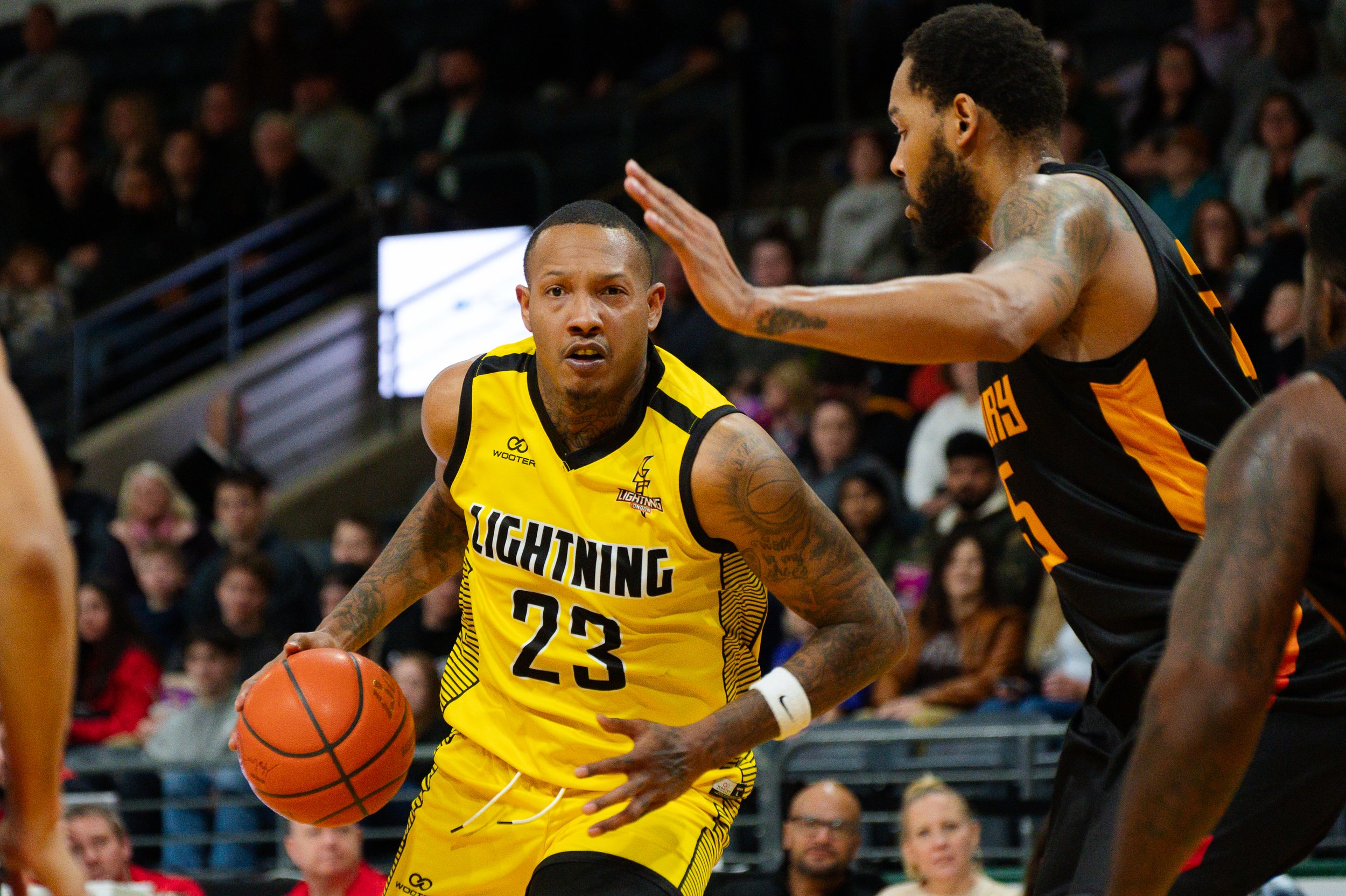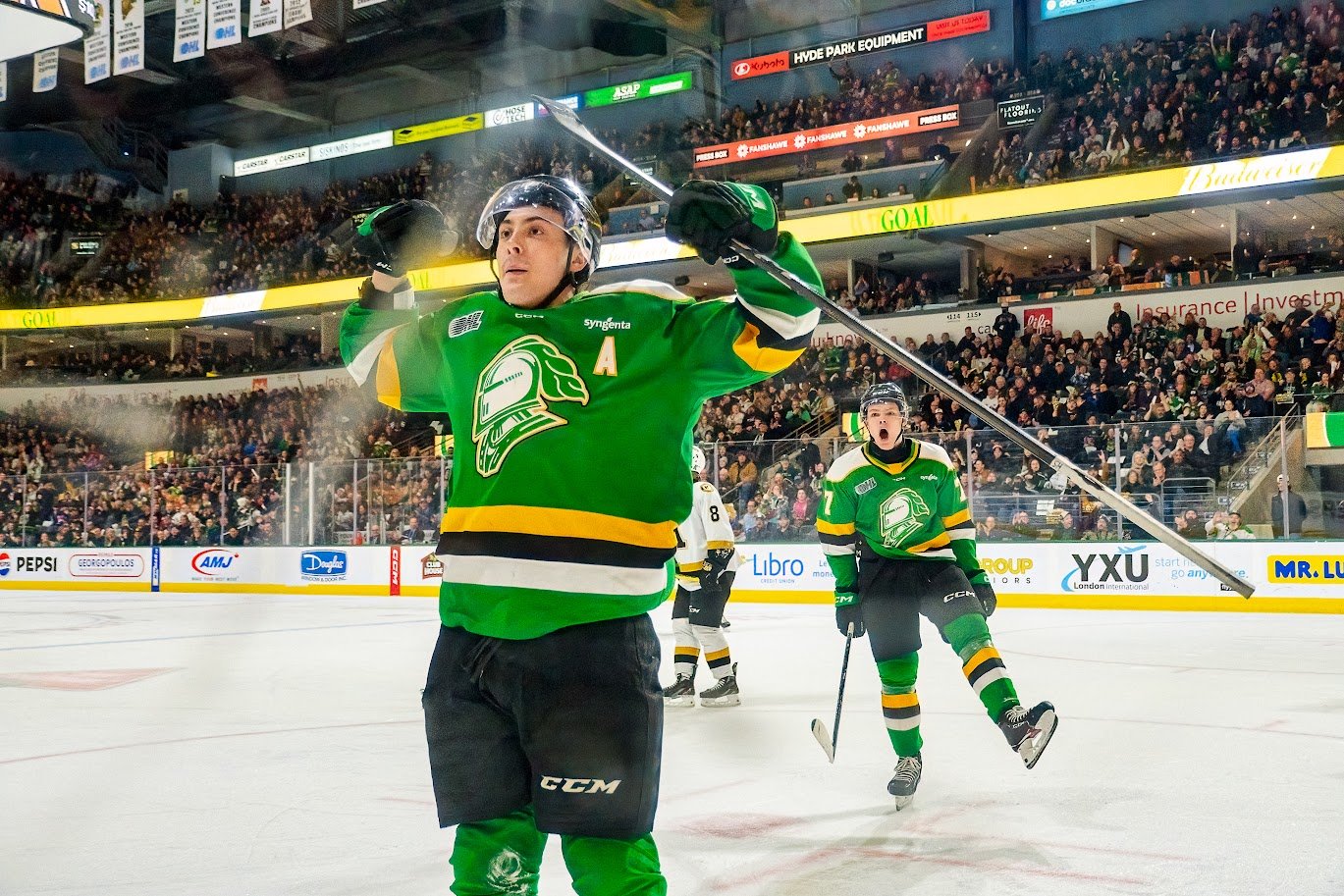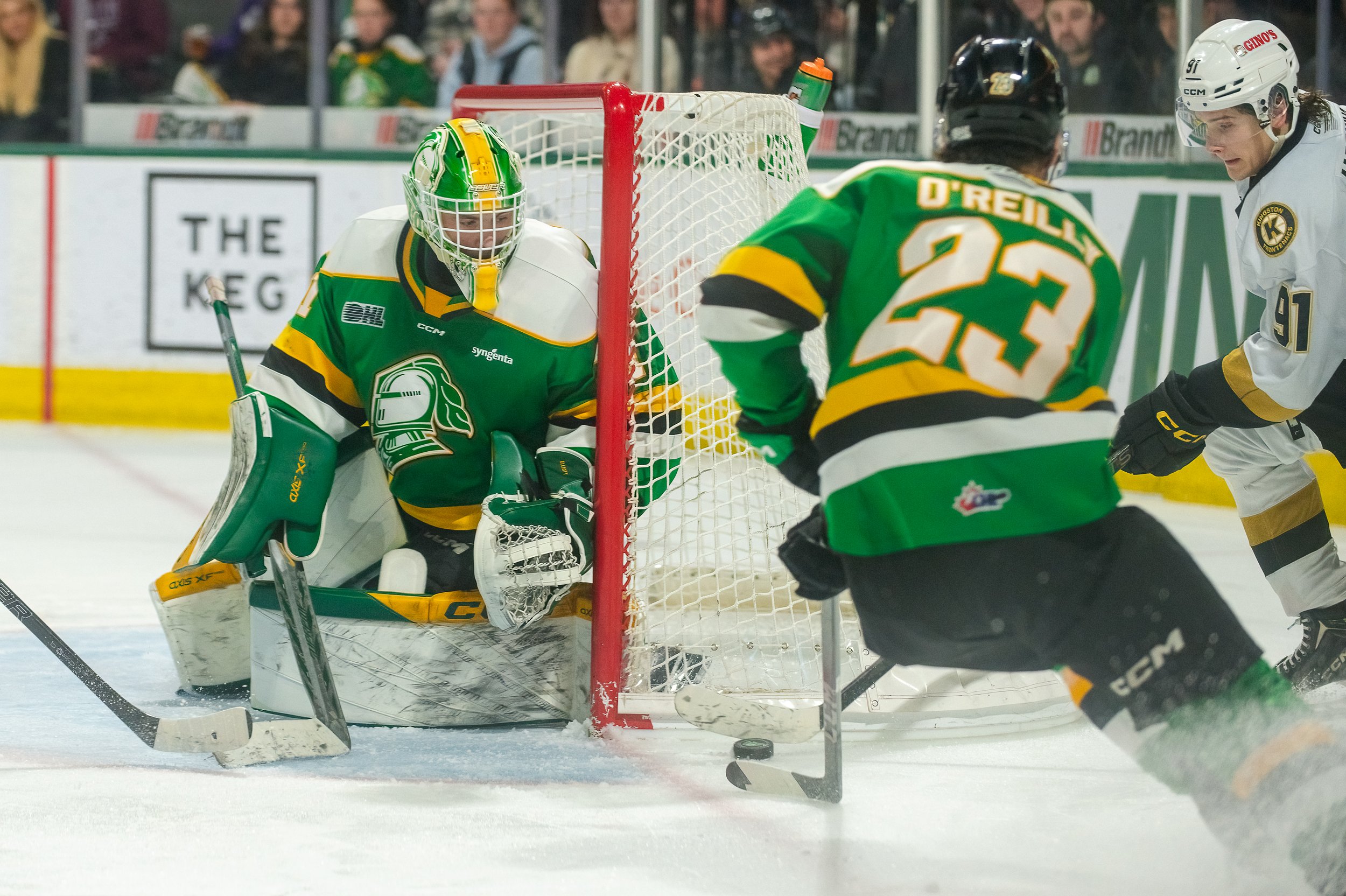Getting into the swing of softball
Beginner clinics, offered by clubs within the London Community Softball League, are motivating a surge in girls’ participation — after three seasons cancelled, or cut short, by the pandemic.
Coach Bill Van Steijn works with young players Charlotte Alexander, Emily Hansen, Kara Anderson, Olivia De Agazio and Taryn Ritchie on the first night of a six-week girls’ softball clinic, hosted by the South London Baseball Association. (Photo: Debora Van Brenk).
* * *
The school gym echoes with a syncopated thud-thud-thud as half a dozen girls toss spongey balls against the wall and then scramble for the rebounds.
Soft arcs and errant bounces make it obvious this could best be described as a starting point.
Coaches Bill Van Steijn and Scott Kitching call a pause. They demonstrate.
Reposition your left foot slightly forward. Reach your right hand back over the shoulder, palm up high like you’re feeding a giraffe. Point your left arm towards the wall. Step. Throw.
Feed the giraffe, point, step, throw. Repeat.
Within minutes, it’s like watching a different group. Balls thwack the wall and bounce straight back. Thwack, retrieve, thwack.
“Just like that – awesome,” Kitching exclaims.
The girls beam.
* * *
This is the first evening of a six-week girls’ softball clinic, run by the South London Baseball Association to introduce girls to the sport.
As they arrive, some of the girls bounce into the gym with their fingers already threaded into ball gloves. Others hang back near the entrance, their eyes darting from parent to player to coach to the cavernous space that looks nothing like a ball diamond.
They’re not the only ones abuzz with nervous energy. Van Steijn and Kitching don’t know for sure if anyone will show up. They know the clinic will be competing for attention against suppertime, Girl Guides, gymnastics, indoor soccer, hockey, video games, homework.
And with three ball seasons cancelled, or cut short by the pandemic, it will be an uphill battle to persuade former players to join, much less introduce new ones to an unfamiliar sport.
“We’re trying to find ways to bring girls into the sport and keep them there,” says Van Steijn. “We want to make it fun, first and foremost.”
Some girls, like 10-year-old Taryn Ritchie, played t-ball, but that was half her lifetime ago and it wasn’t active enough for her. She wants to follow in the basepaths of her older sister Brenna, whose games Taryn has watched since she was little.
“I like running, running the bases, throwing.”
She surprises herself this night by ripping some pitches across the length of the gym. “I didn’t know I could hit like that!”
Then there’s nine-year-old Emily Hansen, invited to play by her friend Olivia De Agazio whose white mitt has already seen one year of softball.
Emily’s line drives whiz past Van Steijn’s head.
“You said you’ve never played before? Never ever?” asks Van Steijn. “That’s some good hitting.”
Seven-year-old Kara Anderson, whose new glove has fuschia lacing that matches her t-shirt and sneakers, makes quick work of some grounders by sliding across the floor on her knees. Grinning, she gives a thumbs-up from the gym floor to her father Matt sitting on the gym stage.
“She’s been talking about this every day for weeks” and was so eager to follow in her sister’s and grandparents’ ballplaying footsteps, he says. “Kara played t-ball a few years ago just before COVID hit and it wasn’t exactly what she’d hoped.”
Taryn Ritchie tries her hand at hitting. (Photo: Debora Van Brenk).
* * *
The South London teams are part of the London Community Softball League, a recreational house league that operates in eight London neighbourhoods and area communities. Several associations within the league also offer learn-to-play sessions.
The youngest kids play with an 11” yellow ball, which the pitcher fires underhand across the plate; older players graduate to a 12” ball. The sport is often called fastball, but is officially called softball at provincial, national and international levels.
Once a mainstay in small towns across the country, softball saw a decline after the 1990s as soccer became more popular and accessible, as competitive hockey became a year-round sport, and as volunteerism among parent-coaches began to sag amid other extracurricular activities.
But national development programs such as CanPitch for pitchers, along with locally driven and provincially supported coaching and playing clinics, started to draw kids and parents back to the game, says Johnathan Baker, executive director of Softball Ontario.
Add to that the contagious success of the Toronto Blue Jays and, “we were growing year over year,” he notes.
For boys’ fastball, small rural towns became hotbeds of the sport. For girls, softball surged in urban centres such as London, Toronto, Ottawa, Kitchener-Waterloo and Brantford.
“Our numbers were climbing, we were growing – up until COVID,” Baker says.
The bottom fell out for three years.
Baker says interest and registration are returning now, but it may be a long road back.
Olivia De Agazio fields a grounder on opening night of a girls’ softball clinic. (Photo: Debora Van Brenk).
* * *
Softball isn’t easy. Not easy to learn, nor simple to practice or to master.
In Baker’s words, “You’re trying to hit a round ball with a round bat, and hit the ball square.” It is a sport of absolutes. You are either out or safe. You’ve either caught the ball or you’ve missed it.
It’s tough for beginners.
And it almost always has to be a collective. Soccer, hockey or basketball, players can practice most of their skills alone. Picture a kid dribbling a soccer ball around pylons in the backyard, firing pucks at a net in the driveway, perfecting layups in the park until she’s just a silhouette against the sunset.
But softball, despite its long moments of waiting between action and quick reaction, needs at least one other person: someone to throw a pitch, someone to hit that pitch, someone to chase a hit ball, someone to catch a thrown ball.
The flip side is that needing all those people means teamwork is softball’s sweet spot.
Teammates become more supportive of each other’s successes and mistakes. They develop higher thresholds for failure and a willingness to persevere.
“Softball offers resiliency and life skills. It’s a great way to make new friends. It may be small, but it’s tight-knit,” Baker says. It fosters lifelong friendships.
* * *
Kitching – a long-time baseball player as well as a coach of two softball daughters and an executive on the South London association – says the most impressive thing about softball is how players support each other.
“We try to make it fun, and winning is more fun than losing. But the biggest thing is helping them enjoy this incredible game and establishing that camaraderie among the players.”
Parent Laura Hansen agrees: “The South London association has a great reputation for empowering girls and building friendships.”
Van Steijn, president of the Community Softball League, hopes getting young players hooked on the game will carry them through and past their adolescence, when participation in sports generally tends to decline.
“It can be a tough world for teenage girls,” he says. “Softball gives them an opportunity a couple of nights a week to leave all those pressures behind them.”
His daughter, Chelsey, pitches in the Tri-County Softball League and helps coach younger kids.
* * *
Back in the school gym, left-handed batter Charlotte Alexander pushes her glasses up her nose and drills a liner between what ordinarily would be first and second base. She grins.
During a water break, she searches for the right words to describe her enthusiasm: “It makes me feel … energetic. I’m not going to sleep well tonight because I’m excited for the next one.”
And then she slips her glove on and trots back to her new friends.
At the end of the session, they gather for their high-fives, and Kitching leads an impromptu call-and-response.
“Who had fun tonight?” Kitching asks. “Who learned something? Who made a new friend tonight? Who wants to do this again?”
Their hands shoot up in unison.
* * *
To learn more about girls’ softball in the London area, contact the London Community Softball League at https://www.londoncsl.com/














Knight Watch: London has won eight straight to open playoffs. Can they continue momentum against Kitchener Rangers?; Star goalie Jackson Parsons gives Kitchener a chance. Columnist Jake Jeffrey previews the matchup …